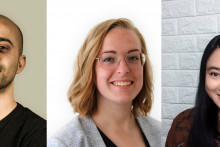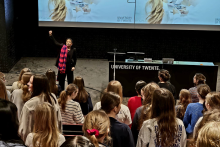What gave you the idea to start a dedicated group to support female doctoral candidates at the UT?
Ruiz Rodríguez: ‘I’ve always been active in supporting women in STEM. Yes, the numbers of women in STEM are increasing, but there is still a gender gap. When I arrived at the UT, I noticed that there were almost no female professors in my department. Walking down the halls, I saw posters with mostly male scientists. There isn’t enough representation. If you don’t see it, you don’t think you can do it. Realizing that, I started wondering what the situation really was at the UT and I approached P-NUT to start the group. Together with my fellow PhD candidates, we were able to do that.’
Can you describe the main goals of the group?
‘Our overall mission and vision is to have an equitable university where we all work together in a safe and supportive environment. We would like to raise awareness of the challenges of female doctoral candidates and bring all genders together. We want to communicate with our male colleagues and help everyone to understand each other.
Many people ask why the focus on gender and not diversity in general. All aspects of diversity and inclusion are important, but inclusion is so broad. It is impossible for a small group to tackle it all. We started the group in November and we were only with five people, and so we had to choose our focus. However, we are connecting with other UT groups and initiatives focused on inclusion and we hope to work together.’
Do you already have any activities planned?
‘We have started a networking group where everyone can meet and discuss various challenges they face. For example, we’d like to reach out to doctoral candidates who are parents as well – because this group faces a different set of challenges We also want to organize mentoring sessions – from professors to doctoral candidates, but also from us to master students. We all were master students once and we didn’t know much about what it was like to be a PhD or PDEng. Therefore, we want to offer mentorship opportunities as well as be mentored. And we are currently planning something great for the 8th of March, the International Women’s Day.’
What are the group’s next steps?
‘As the first step, we are now distributing a survey focused on wellbeing of all doctoral candidates at the UT. We first need to know the context, understand what the situation is and how exactly it is different for female PhDs and PDEngs. We first need to find out what is happening and what could be the reasons before we can properly address it. Plus - we can find out how well doctoral candidates are doing in general, and the results might help to improve the life of everyone on campus, and so every feedback from a doctoral candidate at the UT is important.’
'We need to normalize what is normal'
Have you noticed any specific issues that female doctoral candidates face at the UT?
‘We don’t know the full picture yet, that is why the survey is super important. There is one thing we’d like to address, but I know that there is another initiative at the UT already working on it. We would like there to be freely available sanitary napkins and tampons at the university. After all, half of the population at the UT menstruates. Menstruation can happen suddenly and it can impact how we feel and work. We already opened a discussion about this with our male colleagues at P-NUT. They didn’t really know how much impact this can have. That’s why it’s important to talk about these topics. We need to normalize what is normal.’







